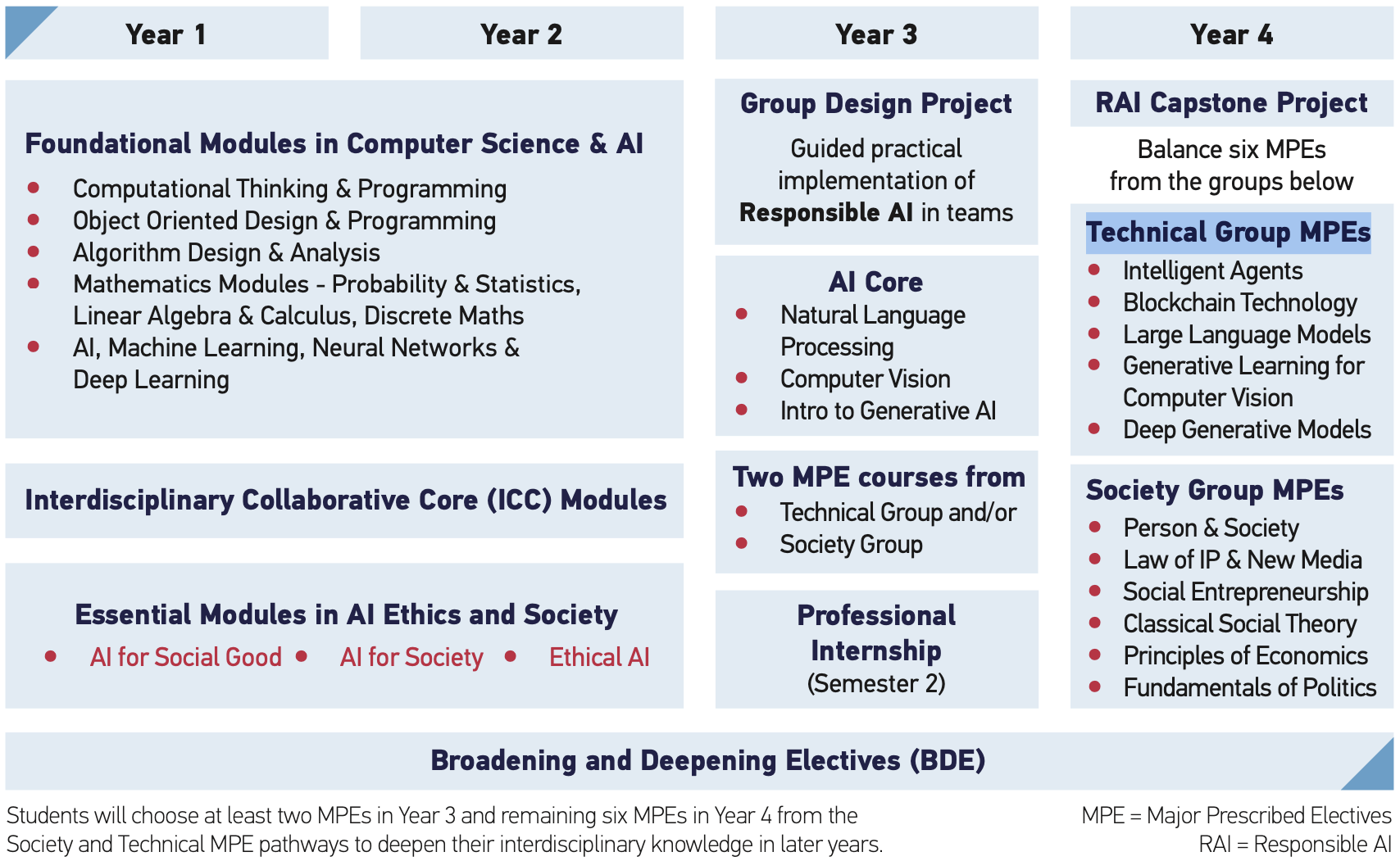The AI and Society programme is designed for forward-thinkers eager to shape the future of technology. This unique degree explores the intersection of AI and societal impact, focusing on responsible AI development and implementation. Students gain cutting-edge technical skills, ethical awareness, and hands-on experience through projects and internships. With an interdisciplinary approach, this programme equips future leaders to innovate, address global challenges, and drive meaningful change in an AI-powered world.
Unique Feature
AI and Society is a computing-centric programme that aims to produce AI engineers and specialists with a solid technical foundation in AI and extensive practical skills to design, develop, and deploy responsible AI systems in real-world settings and across the entire AI lifecycle. It exposes students to issues related to the societal impact of using AI technology and how some of these AI risks can be identified and mitigated.
Through this programme, students will get hands-on experience in an AI in Society group design project, undergo a 20-week industry internship, and, through the Responsible AI (RAI) capstone project, contribute to the design and development of a beneficial AI solution for a specific social or industrial sector of their choice.
Essential Modules in AI Ethics and Society AI for Social Good introduces students to numerous AI social-impact use cases that will demonstrate how existing AI technologies could contribute to tackling cases across all 17 of the UN’s sustainable-development goals, potentially helping societies in both advanced and emerging countries. Ethical AI provide students with an understanding of the myriad of ethical issues and potential risks involved in the design, development and deployment of AI systems and ways to mitigate such risks. It reviews the changing AI regulatory landscape, with focus on Singapore’s own guidelines and legislation governing data and AI (e.g. PDPA and Model AI Governance Framework). Students are exposed to software toolkits such as IMDA’s AI.Verify toolkit to help them design Responsible AI solutions. AI for Society introduces the latest emerging development and applications of AI in different domains (e.g. healthcare, fintech, etc). Students will learn about the urgent issues at the intersection of AI and society that needs addressing, including the discussion of AI generated IP & copyright, amplification of misinformation, etc. Choice of Elective Focus – Students have a large selection of elective courses to allow them the freedom to deepen their AI engineering expertise or broaden their interdisciplinary perspective of AI and society. To encourage a better balance of knowledge from both technical and societal aspects, students will take at least two Major Prescribed Electives (MPE) from each of the baskets of Society and AI Technical electives. |
Admission Requirements
| Qualifications | Selection Criteria |
| GCE "A" Levels | H2 Level pass in Mathematics or H2 Physics or H2 Computing |
| International Baccalaureate (IB) | Pass in HL Mathematics or Physics at Higher Level or Computer Science at Higher Level |
| NUS High School Diploma | Major CAP of 2.0 in Mathematics or Major CAP of 2.0 in Physics |
| International & Other Qualifications | Pass in Senior High School Level Mathematics or Physics at Senior High School Level or UK CIE A Level Computer Science is also accepted |
| Diploma Holders | Above C6 in O-level Additional Mathematics and good grades for at least two Mathematics courses in polytechnic |
Programme Structure & Duration
The Bachelor of Computing (Hons) in AI and Society is a 4-year, full-time undergraduate programme.
| TOTAL ACADEMIC UNITS (AUs): 131 | |||
Year of Study | Major Requirements (81 AUs) | Interdisciplinary Collaborative Core Requirement (32 AUs) | Broadening & Deepening Electives (18 AUs) |
YEAR 1 Acquire basic concepts in mathematics, computing fundamentals and AI potential for social good |
|
|
|
YEAR 2 Delve deeper into the courses in the AI & responsible AI |
|
|
|
YEAR 3 Further deepening in AI applications and practice of Responsible AI skills |
|
| |
YEAR 4 Flexible specialisation choices and a RAI project |
|
| |
Career Prospects
Graduates of this programme will be well-positioned to take on emerging responsible AI specialist roles in a rapidly expanding market and contribute effectively to many industries. They can take on traditional AI roles and, more importantly, are uniquely equipped to take on emerging Responsible AI roles.
- AI/ML Engineers
- AI Scientist
- AI Applied Researcher
- AI Policy Advisors
- Ethical AI Consultants
- Responsible AI Strategist
- AI Ethics Compliance Officer




71c552b9-56d0-4df7-a4b1-8ea31da180b9.png?sfvrsn=71e9d4da_3)


